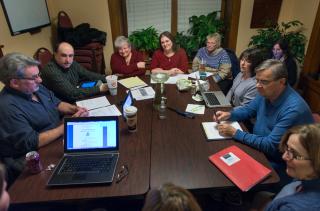2. In the Room Where It Happens: Why We Have Meetings
Although boards are comprised of several board members, they operate as a cohesive entity. They bring different points of view, experiences and cultures to help the congregation serve its mission in the world. This happens through the creative and wise discussions that happen in board meetings.
Good meetings have lively discussions about topics that make a difference. Everyone gets a chance to speak, and everyone listens deeply to what they have to say. Board members appreciate and enjoy one another as they discern what is best for the congregation, its mission and its vision.
Download the Syllabus (PDF) to keep track of your progress!
Effective Meetings
Smooth and efficient meetings require planning, structure, transparency… and practice! It takes a lot of practice to be a good facilitator. Even more importantly, good facilitators don’t go it alone—they ask other leaders to take on different roles to keep the meeting on schedule and on topic.
Setting the Agenda
As leaders, we know that our time is valuable. We hold a shared value as Unitarian Universalists that implicitly and explicitly calls us to honor the worth and dignity–and I would add time–of others, in a way where we honor the value of their time spent in meetings.
Making Room for Multiple Viewpoints
Having a board with diverse perspectives is critically important. Each person will bring his or her own personal and professional contacts and life experiences to their service on a nonprofit board. With a diversity of experience, expertise, and perspectives, a congregation is in a stronger position to plan for the future, manage risk, make prudent decisions, and take full advantage of opportunities. A diverse board that is also sensitive to cultural differences is usually one that has a stronger capacity to attract and retain talented board members — as well as to be in touch with community needs.
Whole Congregation Decisions
Congregational boards are entrusted with many of the operational and sometimes programmatic decisions. But in our congregational polity, certain decisions should be made by the “congregation in meeting” as a “committee of the whole” via a congregational vote. Examples are calling and ordaining a minister, electing the governing board and approving bylaws changes.
Whole Congregation Discernment
There are times when the congregation as a system needs to engage in a process that will enable the congregation to reflect on its future in an organic, open and creative way — as a system. In recent years, there have been many processes and methods that are based on the notion that there is collective wisdom that can be gleaned from the whole.






